- Home
- Steven Brust
Issola (Vlad Taltos) Page 15
Issola (Vlad Taltos) Read online
Page 15
I could see that Aliera wanted to argue with him, but apparently couldn’t find any good pretext, so she clamped her jaw shut, and returned. I found I was enjoying this: two sorcerers, who had to be dying to investigate one of the most remarkable discoveries in the history of magical philosophy, and they were just going to have to wait.
To add some more confusion into the mix, I said, “Excuse me. This rock-that-turns-into-Orbs. Would you mind telling me about it?”
“It’s magical,” said Aliera dryly.
I glanced over at Teldra, but she was just standing, near the wall, the epitome of patience. I turned back to Aliera and said, “Thanks loads.” She started to speak, but I cut her off. “Look, there’s too much I don’t understand here, and neither do you. If we’re going to work this together, I’d like to have some idea of what this stuff is we’re talking about. We’re paralyzed until we have at least a reasonable guess about what is real and what isn’t.”
“I have never,” said Aliera, “had any particular problem knowing what is real.”
“Oh, no? Think about it. Morrolan is right. Why do I see what you don’t? Whose mind has been tampered with? What is the illusion? And, more important, why? That’s the part that really bothers me. I can understand casting an illusion in front of all our eyes, but why then remove it from one of us, or some of us, whichever it is?”
Aliera frowned. “All right,” she said. “Granted. I don’t know.”
Morrolan cleared his throat. “It is possible,” he said, “that removing the illusion was an error. We still don’t know exactly what happened while you were gone. Did you, for example, use your chain?”
I was suddenly very aware of Spellbreaker, wrapped around my wrist. “Yes,” I told him. “As it happens, I did. At least, in my mind. I thought about it. Could just invoking Spellbreaker in my mind have broken the illusion?”
“Perhaps,” said Morrolan.
“Perhaps,” I agreed. “Then again, perhaps not? How can we tell?”
“Let me think about that,” he said.
“Okay,” I agreed. “While you’re thinking, could you fill me in a little?”
“On what?”
“For starters, just what is that rock?”
“Well,” said Morrolan, “you know, basically, how sorcery works, right?”
“I know how to do the simple stuff, if that’s what you mean.”
“No, I’m talking about how it works. The theory.”
“Oh. No, I’m proud to say I haven’t a clue.”
“Oh,” said Morrolan, with a look that indicated he was suddenly stumped. I took a perverse pride in that. I guess I was in a mood.
Aliera came to his rescue. “The basic idea,” she said, “is simple enough: Everything is made of matter, or energy, which is the same thing in a less organized form. Amorphia is the opposite of matter. The purple vein in that rock is necrophia. Necrophia is a substance which can control amorphia, and which responds to the human—or Eastern—brain. Sorcery is the art of learning to manipulate necrophia, as Elder Sorcery is the art of learning to manipulate amorphia.”
She stopped, as if she were done. Heh. I said, “And necromancy?”
“The art of using necrophia, and amorphia, to control the energy levels of different life-states.”
Oh, well, now I understood everything. Heh. I said, “And witchcraft?”
She looked at me, blinked, then turned to Morrolan.
“Witchcraft,” he explained, “is something else again.”
“Ah,” I said. “Well, good. That helps.” Before they could respond, I remarked, “I’ve never heard of necrophia before.”
“Your education,” said Aliera, “is sadly lacking.”
Morrolan said, “Witchcraft is a process of understanding and changing—the more you understand a thing, the more you can change it, and the more you work to change it, the more deeply you understand it. Sorcery is a process of correspondence—the minute amounts of energy generated by the mind must be made to correspond to the Orb, which in turn permits the release of the energy contained in the Sea of Amorphia, and this energy thus becomes available to use to manipulate the world.”
“You should have been a teacher.”
He ignored me. “That rock you describe contains an ore that has the property of resonating with amorphia, and with our minds; that is why the Orb was constructed from it.”
“All right, I can see that. Mmmm. I imagine it is rare?”
“It only appears as a gift from the gods.”
“Okay, that would be rare. Is it sentient?”
“How could it be sentient?”
“You’re right,” I said. “Stupid question.” I don’t know if he caught the irony, but I’m fairly sure Aliera did; she smirked. I continued, “All right, I think I see a bit of how the arts fit together. Now: Why would the Jenoine put us in a room with this in it?”
He didn’t have an answer for that one. Morrolan has always been better at understanding how objects work than how other beings are thinking.
Teldra said, “They don’t think the way we do.” Because it was Teldra, I didn’t make any remarks. She continued, “They don’t consider us enemies in the same way we consider them enemies; nor do they see us as threats. They worry about our escaping the way one might worry about a pet greeterbird making its way out of its cage; and they worry about our damaging their artifacts the way one might worry about a pet kitten getting into the jewelry box. By sealing the area against necromantic gates, and laying a mild glamour on us so that we cannot see the objects in the room, they believe they have done enough.”
There was a moment of silence; then Morrolan cleared his throat. “How long have you known this?” he said.
“I suppose, in a way, since I spoke to them. What I have just told you, my lord, only occurred to me this instant. I am still considering the matter and trying to understand, but it seems to me that they spoke to me—insofar as I could perceive tone—in the tone one might use to, well, a greeterbird. They were amused that I could form any sort of coherent thought; they think we’re cute.”
“Cute,” said Aliera e’Kieron.
“Cute,” said Morrolan e’Drien.
“I am cute,” said Loiosh.
I said, “And that didn’t, uh, annoy you at all?”
“I thought it interesting,” said Teldra. “Actually, I didn’t put it together in exactly that way; I’ve been thinking about it since the conversation, and that is my conclusion.”
“Hmmmm,” I said.
“Cute,” repeated Aliera.
“All right,” said Morrolan. “I think we can accept that. So, what do we do?”
“Kill them,” said Aliera.
Morrolan rolled his eyes. “Of course we’re going to kill them,” he said. “I meant, how?”
“I wonder,” said Aliera, and her voice trailed off.
Morrolan waited, then said, “Yes?”
Aliera hesitated, then finally said, “Do you suppose, if Vlad were to strike us with Spellbreaker, it would break the glamour on us?”
Morrolan frowned his thoughtful frown. I contemplated giving Morrolan and Aliera a good, hard whack apiece, and tried to refrain from smiling. Morrolan said, “I believe it would be less likely to remove the glamour than to, uh, damage many of the items you and I carry about with us, if you understand what I mean.”
Aliera nodded. Oh, well. I wouldn’t have enjoyed hitting Teldra anyway.
“But,” said Morrolan, “I do want some way to remove the glamour; that stone could be very useful. And, perhaps, some of the other things in here could be useful as well. Have you any ideas, cousin?”
She shook her head. Then Lady Teldra cleared her throat; conversation stopped and we all stared at her. It would have been terribly embarrassing if she’d had nothing more than the need to clear her throat. But, no, she said, “It is just possible that the stone itself could help.”
Aliera frowned. “I don’t understand. If we can’t even see i
t … ?” She was a lot more polite than she’d have been asking that question of Morrolan or me.
Teldra said, “Vlad can see it.”
Morrolan scowled. “The air in this place must slow my brain down. You’re right, of course.”
I cleared my throat; quite a different effect than when Teldra did it. “Uh … what exactly does this involve?”
“Nothing you haven’t done before,” said Morrolan.
“Heh. There are many things I’ve done before—”
“You must let me see through your eyes,” he said. “It is a simple enough spell, as you recall.”
“Yeah, I know that. But there’s a no sorcery here. Can we do it with pure psychic energy?”
“Not reliably enough,” he said. “But we have no need to.”
“Oh? Without sorcery, what do you use as a link?”
For answer, he drew Blackwand. I recoiled instinctively from the assault on my mind—the feeling, something in between hearing and smell, of a hungry animal; a feeling that has to have been built into me at some level of instinct or below, that made me aware of the sweat in my armpits, and how hard it was to breathe, and made the room, however large it was, seem too close.
Suddenly I wasn’t having fun anymore. “I’d rather not touch the blade, if it’s all the same to you,” I said.
He seemed amused; maybe it was his turn to have fun. He said, “Well, I’m certainly not going to let you hold her.”
“I—”
“Don’t worry; she doesn’t bite.”
I stared at the dark, dull grey blade, then back at Morrolan. “Yeah, right.”
“Do it, Vlad.”
“I—”
“Do it.”
I took a deep breath, hesitated, then laid my palm on the blade quickly, before I could think about it too much. It was faintly warm, which metal isn’t supposed to be. And it almost seemed as if it were vibrating, or trembling, just a little.
“Okay, dammit, do it before—”
“Keep still, Vlad. I have to concentrate.”
I tried to keep my growl inaudible.
Loiosh’s feet shifted on my shoulder; he wasn’t liking this either. I can’t say why, and it doesn’t make sense, but that made me feel a little better.
The most terrifying things, in some ways, are those that catch us off guard—a shock out of nowhere, danger unanticipated, all that. And yet, in other ways, to see something coming, know it is about to happen, and be unable to prevent it has its own special terror. But there are times—rare, but they happen—when you see the danger before you, it builds up, you brace yourself—and then it’s over, before you had time to really get a good scare going, much less the unpleasantness that you were scared of.
This was like that.
Morrolan said, “Okay, I’m done.”
“You’re done?”
“Yes.”
“That’s it?” Even as I questioned him, my hand was free from that blade, jumping off as if of its own volition.
“That’s it,” said Morrolan.
“Uh … did it work?”
He nodded and turned to Aliera. “All right, cousin. Your turn.”
“I don’t feel any different,” I said.
They ignored me. Loiosh said, “Boss, it would be Morrolan who feels different.”
“Oh,” I said. “Yeah, I knew that.”
Now Aliera drew Pathfinder, but she swung it over toward Morrolan; it no longer had anything to do with me, so I was free to back away. I did so.
Presently, Aliera turned to Lady Teldra. “This will be trickier,” she said.
Teldra nodded and came forward; I didn’t want to watch, so I walked over to Morrolan. “Well?” I said.
“Well what?”
“Are you now seeing—”
“Yes.”
Creep.
“So, how was my description?”
He glanced around the room, and grunted; I imagine so he wouldn’t have to tell me how good a job I’d done. Teldra, by this time, was blinking rapidly and looking all about.
“Okay then,” I said. “We’ve gotten this far. What next?”
No one answered me directly, but Aliera looked at the door that she could now, evidently, see quite clearly. Then she looked an inquiry at Morrolan. He winced. It was obvious that he wanted to go exploring, and was damned curious to see our river of amorphia; it was equally obvious that he didn’t think it was what he should do just then.
“All right,” said Aliera, who could read him as well as I could. “We’ll wait on that.” She went over to the rock, and began studying it; her hands reached out as if to touch it, stopped, drew back. She frowned.
“Yes,” she said. “It is trellanstone.” She smiled suddenly, “And a nice, big, juicy one, too.” Her eyes were green, and looked alarmingly catlike, and I would have gotten worried if I hadn’t been worried already.
“All right,” I said. “Let’s hear it.”
“It’s simple enough,” said Aliera. “The trellanstone will permit us to break through whatever is blocking—”
“No,” said Morrolan.
“What do you mean, no?”
“That isn’t how we’re going to do it.”
“Oh?” said Aliera. “It isn’t? Then, pray, how are we going to do it?” She let the irony drip from her lips onto the floor and crawl over to rub against Morrolan’s leg.
My eyes rolled up of their own accord. I walked to the far side of the room, pretty much out of earshot, because listening to Morrolan and Aliera yell at each other was already getting old; I found it was not one of the things I missed, although it had never bothered me before. I wondered if being away from people had changed me, made me less patient with minor annoyances.
“No, Boss, it’s just made you introspective.”
“Shut up, Loiosh.”
“Impatient, too.”
I sent a psychic growl in his direction, then sat down against a wall and leaned my head back. Morrolan and Aliera, after an instant of conversation, walked out of the door Teldra and I had found. I blinked. Well, I suppose they figured if they were going to argue, they might as well investigate our story at the same time.
Teldra came over and sat down next to me.
I said, “Well, whatever happens, it has been a pleasure having the chance to speak with you.”
“Thank you, Vlad. I feel the same way.”
I wondered if she really did. That’s the tricky part about the Issola; you can never be certain how they are feeling. Maybe it doesn’t bother Dragaerans, not knowing how someone is actually feeling, but we Easterners aren’t like that. I wondered if it bothered Teldra to know that, when she really, actually liked someone, that person would always have to wonder how much was genuine, and how much was show.
After some time, Morrolan and Aliera came back through the door, approached us, and Morrolan said, “All right, we have a plan.”
“That’s lucky,” I told him.
His eyes narrowed, but he must have decided to let it pass. Best for him.
“Worked yourself into a mood, haven’t you Boss?”
I mentally grunted at my familiar. Morrolan said, “We’re going to attempt something with the trellanstone. We’re going to—”
“Use it to break through whatever is blocking you from opening the gate?”
He closed his eyes, then opened them again. Then he slowly and carefully explained the plan to me. Teldra gave nary a twitch of an eyebrow, and Aliera’s eyes had turned blue. When Morrolan was finished, he said, “Are there any questions?”
I hardly knew where to begin. I said, “How did you come up with that idea?”
“In part, because of your river of amorphia. The fact that they have it changes everything. And, moreover, this is something that—I believe—lies within our power.”
I grunted at him and muttered, “If all you’ve got’s a stick, everything looks like a kneecap.”
“Beg pardon?” said Morrolan.
“Nev
er mind; old Jhereg saying.”
He graced me with a look of distaste and turned to Lady Teldra. “You are clear on your role?”
“Yes, my lord.”
“Aliera?”
She rolled her eyes, which Morrolan and I took as an affirmative.
“Then let’s begin.”
“He didn’t ask if I was ready.”
“And I’m not going to either.”
Morrolan took a position next to the trellanstone, hovering over it like a goose over her goslings. Aliera stood in front of it, to Morrolan’s left, and laid her hands on it, touching and feeling it as if looking for handholds. For this stage, Teldra and I were back and out of the way, watching. Aliera’s hands came to rest, and she nodded to Morrolan. He licked his lips. I recognized that gesture—I’d been there often enough myself, just before trying something difficult and a little scary.
Sometimes it almost seemed as if Morrolan were human. He placed his hand on the stone, near Aliera’s. Presently he said, “All right, I’m getting something.”
“Yes,” she said.
I couldn’t see her face, but I saw the concentration in the muscles of her back, and in Morrolan’s case, in the muscles of his jaw. They were working. It was nice to see for a change. They fell silent, I assume communicating psychically; Teldra and I waited patiently for them to finish. Or, rather, Teldra waited patiently; I waited. Presently my feet started to hurt; standing hurts more than walking. I shifted from foot to foot and tried to catch Teldra’s eye, but she was watching the sorcerers work.
Abruptly, and for no reason I could see, the veins in the stone began to glow—not much, you had to be watching closely, but it was there, like a yellow phosphorus, if you can imagine such a thing.
Morrolan said, “Okay, Vlad. Get ready.”
“I’m ready,” I told him, which wasn’t entirely a lie. I let Spellbreaker fall into my hand, and felt a very small, subtle vibration running through it, almost a tremble, as of eagerness.
“Boss—”
“Not now, Loiosh. I don’t want to think about it.”
Easier said than done, that not thinking about it business; but I really didn’t want any distractions just then, because if Morrolan’s plan worked, things were just about to get interesting. I touched the rapier at my side, started to check my daggers before remembering that most of them were lying in pieces around the room. My hand accidentally touched the sheath of the Morganti blade I still carried; my hand then returned to the hilt of my sword and remained there, so I looked like I was ready to draw in a hurry—like I was ready for action. Maybe Morrolan would be impressed if he glanced over at me. Maybe if the Jenoine showed up suddenly they’d see how ready for action I was and die of fear.

 Phoenix
Phoenix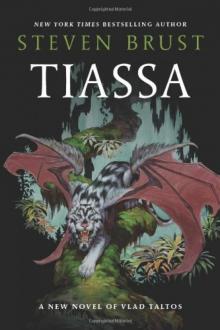 Tiassa
Tiassa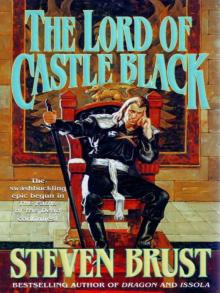 The Lord of Castle Black
The Lord of Castle Black To Reign in Hell: A Novel
To Reign in Hell: A Novel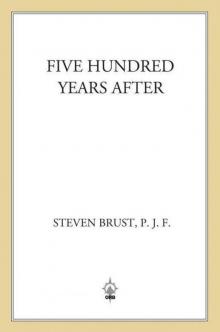 Five Hundred Years After (Phoenix Guards)
Five Hundred Years After (Phoenix Guards)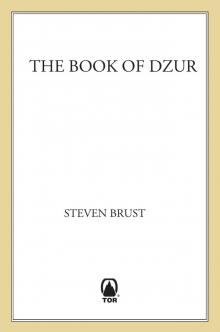 The Book of Dzur: Dzur ; Jhegaala
The Book of Dzur: Dzur ; Jhegaala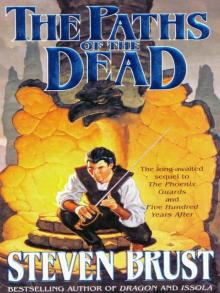 The Paths of the Dead
The Paths of the Dead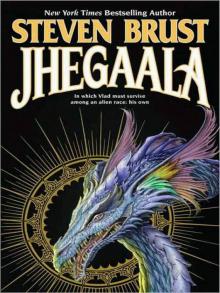 Jhegaala
Jhegaala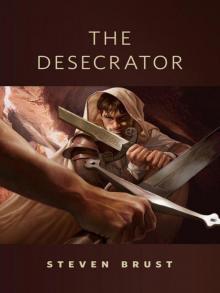 The Desecrator: A Tor.com Original
The Desecrator: A Tor.com Original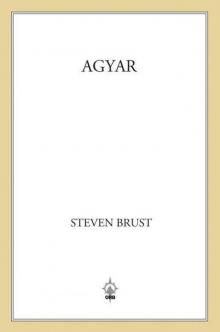 Agyar
Agyar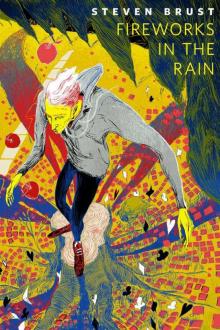 Fireworks in the Rain
Fireworks in the Rain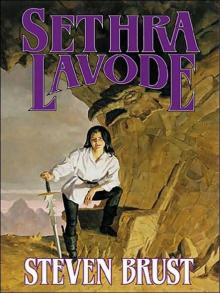 Sethra Lavode
Sethra Lavode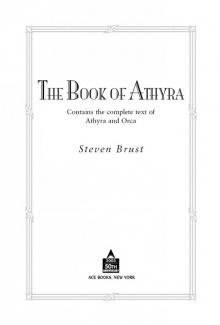 The Book of Athyra
The Book of Athyra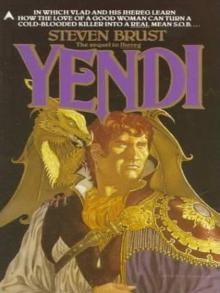 Yendi
Yendi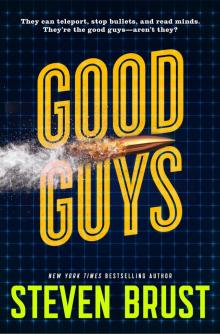 Good Guys
Good Guys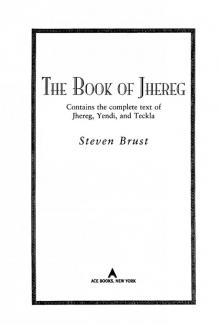 The Book of Jhereg
The Book of Jhereg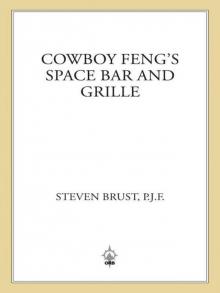 Cowboy Feng's Space Bar and Grille
Cowboy Feng's Space Bar and Grille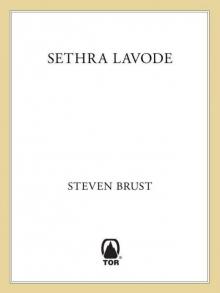 Sethra Lavode (Viscount of Adrilankha)
Sethra Lavode (Viscount of Adrilankha) My Own Kind of Freedom
My Own Kind of Freedom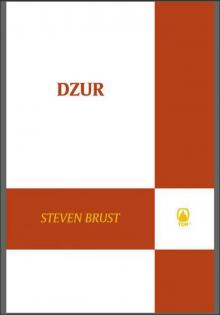 Dzur (Vlad Taltos)
Dzur (Vlad Taltos)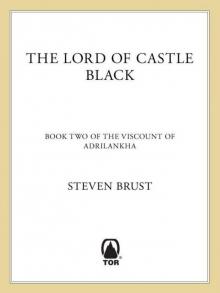 The Lord of Castle Black: Book Two of the Viscount of Adrilankha
The Lord of Castle Black: Book Two of the Viscount of Adrilankha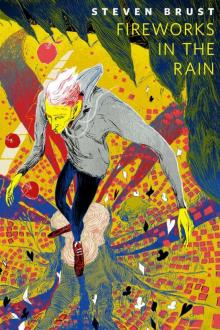 Fireworks in the Rain: A Tor.Com Original
Fireworks in the Rain: A Tor.Com Original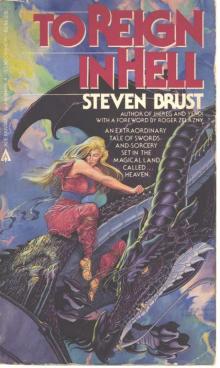 To Reign In Hell
To Reign In Hell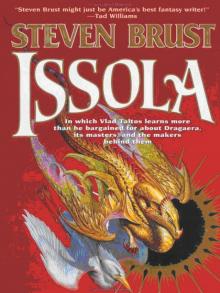 Issola
Issola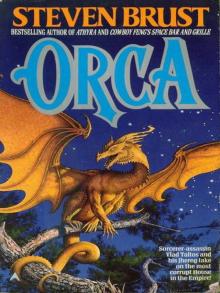 Orca
Orca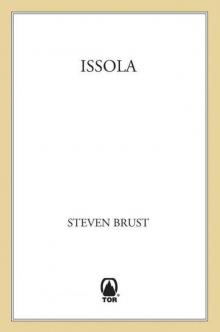 Issola (Vlad Taltos)
Issola (Vlad Taltos)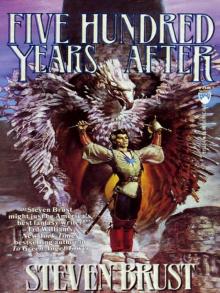 Five Hundred Years After
Five Hundred Years After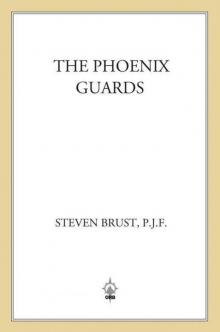 The Phoenix Guards
The Phoenix Guards Taltos
Taltos![[Vlad Taltos 06] Athyra Read online](http://i1.bookreadfree.com/i1/03/24/[vlad_taltos_06]_athyra_preview.jpg) [Vlad Taltos 06] Athyra
[Vlad Taltos 06] Athyra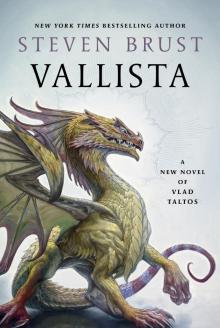 Vallista--A Novel of Vlad Taltos
Vallista--A Novel of Vlad Taltos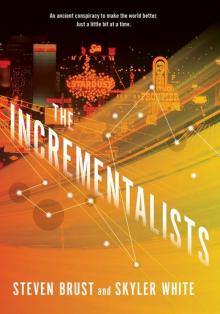 The Incrementalists
The Incrementalists![[Vlad Taltos 04] Taltos Read online](http://i1.bookreadfree.com/i/03/24/[vlad_taltos_04]_taltos_preview.jpg) [Vlad Taltos 04] Taltos
[Vlad Taltos 04] Taltos![[Vlad Taltos 03] Teckla (v 1.1) Read online](http://i1.bookreadfree.com/i1/03/27/[vlad_taltos_03]_teckla_v_1_1_preview.jpg) [Vlad Taltos 03] Teckla (v 1.1)
[Vlad Taltos 03] Teckla (v 1.1)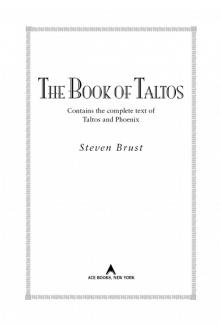 The Book of Taltos
The Book of Taltos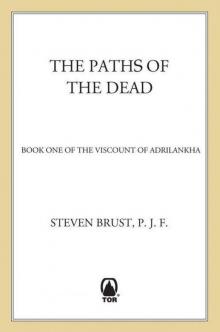 The Paths of the Dead (Viscount of Adrilankha)
The Paths of the Dead (Viscount of Adrilankha) Jhegaala (Vlad Taltos)
Jhegaala (Vlad Taltos)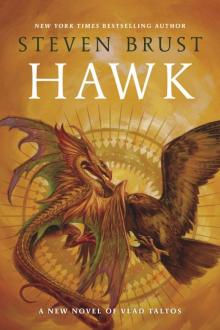 Hawk (Vlad)
Hawk (Vlad)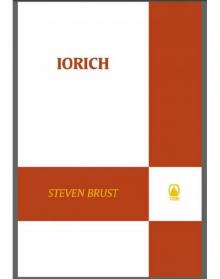 Iorich
Iorich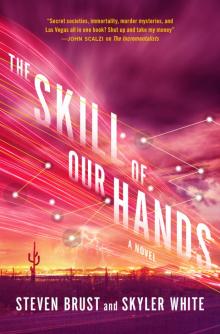 The Skill of Our Hands--A Novel
The Skill of Our Hands--A Novel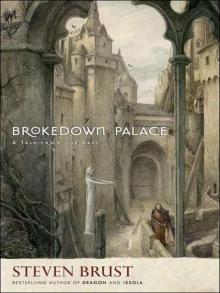 Brokedown Palace
Brokedown Palace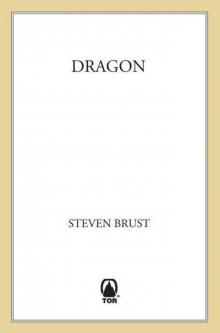 Dragon (Vlad Taltos)
Dragon (Vlad Taltos) Dragon
Dragon Athyra
Athyra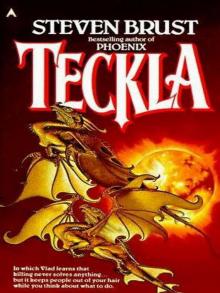 Teckla
Teckla Dzur
Dzur